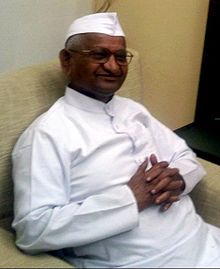Anna Hazare: Ex Fast Facto – Analysis
By IPCS
By PR Chari
It would be churlish to deny Anna Hazare his hour of glory. His 13-day fast has galvanized public opinion across the country-not merely urban middle class India-against the monster of corruption that is touching everybody, irrespective of caste, creed, or community. Clearly, liberalization of the India economy since 1991 has freed big business from the malfeasance inherent in the licensee-permit raj. But, the common man remained shackled, forced to interact with officialdom for getting certificates, permissions and clearances, allowing exactions at every step. Anna Hazare has plumbed the deep wells of the resultant anger in the population that was waiting to explode. And, by targeting Parliament’s lethargy in establishing the Lokpal (ombudsman) institution, Anna could channel this growing anger to focus attention on the general issue of corruption excoriating India, and the helplessness of the people to get their elected representatives to work for the common good or prevent them from becoming the fountain-heads of corruption.
No right of recall exists in the Indian Constitution; its framing fathers had not anticipated the kind of members that now adorn Parliament. Several have established criminal antecedents; many are being investigated, while still others are being prosecuted for criminal and civil transgressions, apart from tax evasion. Quite routinely, declarations of their wealth are being made. But no explanations are sought regarding their sources of wealth or, more intriguingly, how their wealth appreciably increases after a term in office. Equally routinely, the astronomical sums of money being expended in the elections by the Honourable Members and their parties are informed. But, are these figures rigorously audited, despite suspicions that they are fudged. All are agreed that electoral financing lies at the root of corruption in India. Then, why is Parliament reluctant to address this issue? Is it due to much of these funds getting wedged between sticky fingers en route to Party Headquarters? Anna Hazare would do well to bend his energies to reforming the electoral process, before proceeding further with his campaign.

But, what has he achieved with his fast? Very little, indeed. The UPA government has conceded in principle that it would consider Team Anna’s demands to include the citizen’s charter in the proposed legislation, extend the Lokpal’s jurisdiction to the lower bureaucracy, and set up Lokayuktas in the states. Its views would be sent to the concerned Departmental Standing Committees charged with evaluating the substance of the Lokpal Bill. This had been offered by Abhishek Singhvi, Chairman of this Standing Committee, at the start of Anna’s agitation, viz. that the Committee could examine the Jan Lokpal Bill, the official Bill, and any other draft Bills presented to Parliament. Indeed, no other modality is possible in a Parliamentary democracy. Only the legislature can enact laws after debating them in the House. Insisting that a particular legislation be accepted by the House would be a gross travesty.
No guarantees could, therefore, have been given that these issues underlined by Anna would be accepted by the House and included in the Lokpal Bill. Again, assuming the acquiescence of the House is undemocratic. The puzzle, therefore, remains what Team Anna believes it has achieved from this agitation and the widespread mobilization of civil society in its support, apart from promoting the self-image of the leaders and their supporters.
A less critical analysis of Anna Hazare’s fast would urge that his team has mobilized civil society to demand fair governance. New Delhi and the state capitals are now on notice to eradicate corruption. Much requires to be done. Apart from electoral reforms the conceptual areas requiring urgent attention are reducing the physical interaction of citizens with state authorities, establishing time-bound limits to the disposal of citizens’ requests, utilizing technology sensitively, and simplifying appeal procedures.
The vast majority of common citizens are forced to interact with the government for simple requirements like age, caste and income certificates, make payments of taxes and so on. These provide fruitful opportunities for harassment of the citizen, extraction of bribes by delaying action, and letting the ‘dalals’ (middlemen) flourish and share the booty with corrupt officials. Allowing such requests to be made electronically, and ensuring their disposed within set time limits would take care of the majority of these cases, affording great satisfaction to civil society. A signal service would be rendered by identifying the ‘dalals’ for public exposure.
The above example is illustrative. A vast terrain is available for action in the anti-corruption campaign, which can proceed further to include the lower judiciary, police force, transport arrangements, civic amenities, health, and education services and so on. A concerted approach is required. Apart from the stratospheric Lokpal level, therefore, much needs to be done by Team Anna to clean up the structural and operational levels of corruption that affects everyone in India.
PR Chari
Visiting Professor, IPCS
email: [email protected]
